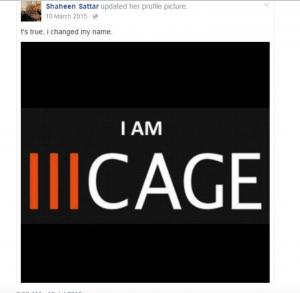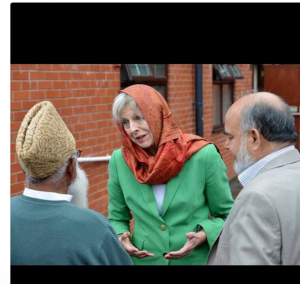Theresa May emphasised her vision for a united Britain in her first speech as Prime Minister. Judging from responses to some of her appointments she has succeeded in uniting in bafflement those on both left and right. However one issue which sharply divides commenters is her approach to Islam.
Shaheen Sattar doesn’t keep her readers guessing long as to her own views. Her piece for the Independent was titled:
As a British Muslim, I’m terrified that Theresa May – winner of 2015’s Islamophobe of the Year – is my new Prime Minister
The article opens with some particularly tendentious criticisms of Prevent – and it’s hard to take seriously a critique which is driven by the fact Theresa May was awarded the title of ‘Islamophobe of the year’ in 2015 by the Khomeinist Islamic Human Rights Commission. (Particularly when you remember that Charlie Hebdo was, grotesquely, given an award in the same year.)
This was an interesting sentence:
When it was announced that she was to become Prime Minister by default, I pictured 3 million British Muslims on an iceberg being violently prodded by May to move further away from their faith.
Just what is included in the term ‘their faith’? I have seen no evidence of Theresa May wishing to ban the hijab (more of that later) or outlaw fasting. Perhaps this image, expressing support for the Islamist CAGE, reveals what elements of her faith Sattar feels may be imperilled by May.
Alternatively, to be fair, it may simply indicate that she has tribal reflexes.
Some of the sharper commenters under Sattar’s anguished article take the opposite view of May – that she is a dangerous apologist for Shariah law. Robert Spencer (who was prevented by May from entering the UK) warns that she will be ‘the weakest, most appeasement-minded Prime Minister since Neville Chamberlain’.
A particular focus for Islamosceptic disapproval is Theresa May’s conduct of an enquiry into Sharia councils. Many have misquoted and flattened her words, implying her active approval for Sharia law.
May sparked controversy when she spoke out in support of the Islamic courts operating in the country, telling the nation they could “benefit a great deal” from Sharia teachings.
This oft repeated assertion seems to be derived from this more anodyne statement from May:
Many British people of different faiths follow religious codes and practices, and benefit a great deal from the guidance they offer.
However there are legitimate concerns about the terms of reference for the Sharia court review, and Gita Sahgal, Maryam Namazie and other human rights activists have expressed disquiet.
Women’s rights groups initially welcomed the move as a rare opportunity for the state to examine the resurgence of Islamism via sharia courts and its impact on gender equality.
But Ms Namazie, who set up the campaign One Law For All, said they now fear the review, which states it will “seek out best practice among sharia councils” could lead to their endorsement.
Yet some concerns with ‘Sharia May’ as she is now (bizarrely) being called are less well earned. There’s been much wailing and gnashing of teeth over the fact she covers her hair when visiting mosques.
It seems rather more reasonable to point out problems with Theresa May’s assertion that the Paris attacks had ‘nothing to do with Islam’. Many – including Muslims as well as more obvious suspects – would disagree with her on that. On the other hand, one can understand why Theresa May (like David Cameron and many other politicians) is willing to make rhetorical concessions in the hope of achieving consensus over tackling extremism – a hope which groups like the IHRC and CAGE are determined to dash.
Many of those bemoaning May’s success had placed their hopes in Andrea Leadsom as the leader who’d take a more robust line on these matters. I assume they hadn’t caught up with her rather cringey recipe for an ideal British society
Take one cup of Anglo Saxon determination;
Mix with a jugful of Muslim respect for the family;
Stir in a pinch of traditional Asian modesty;
Whisk with two tablespoonsful of military respect for authority;
Serve on a bed of East European work ethic;
And enjoy with a full glass of British belief in the freedom of the individual!




